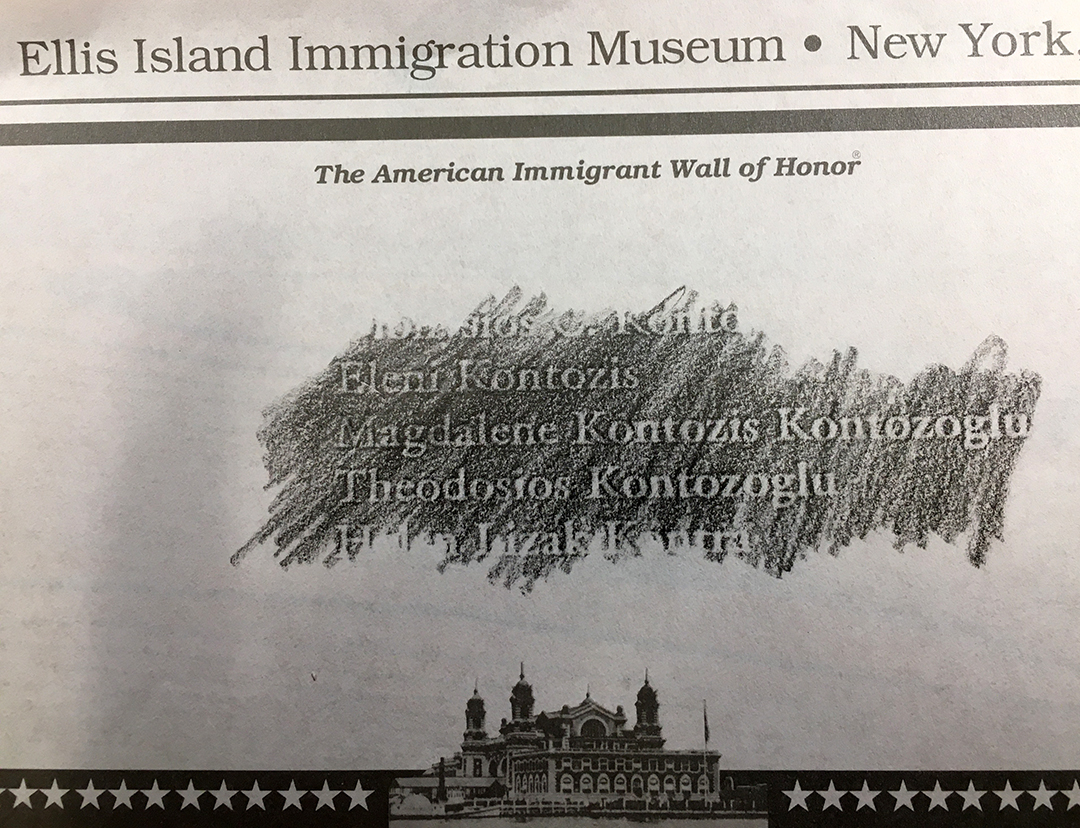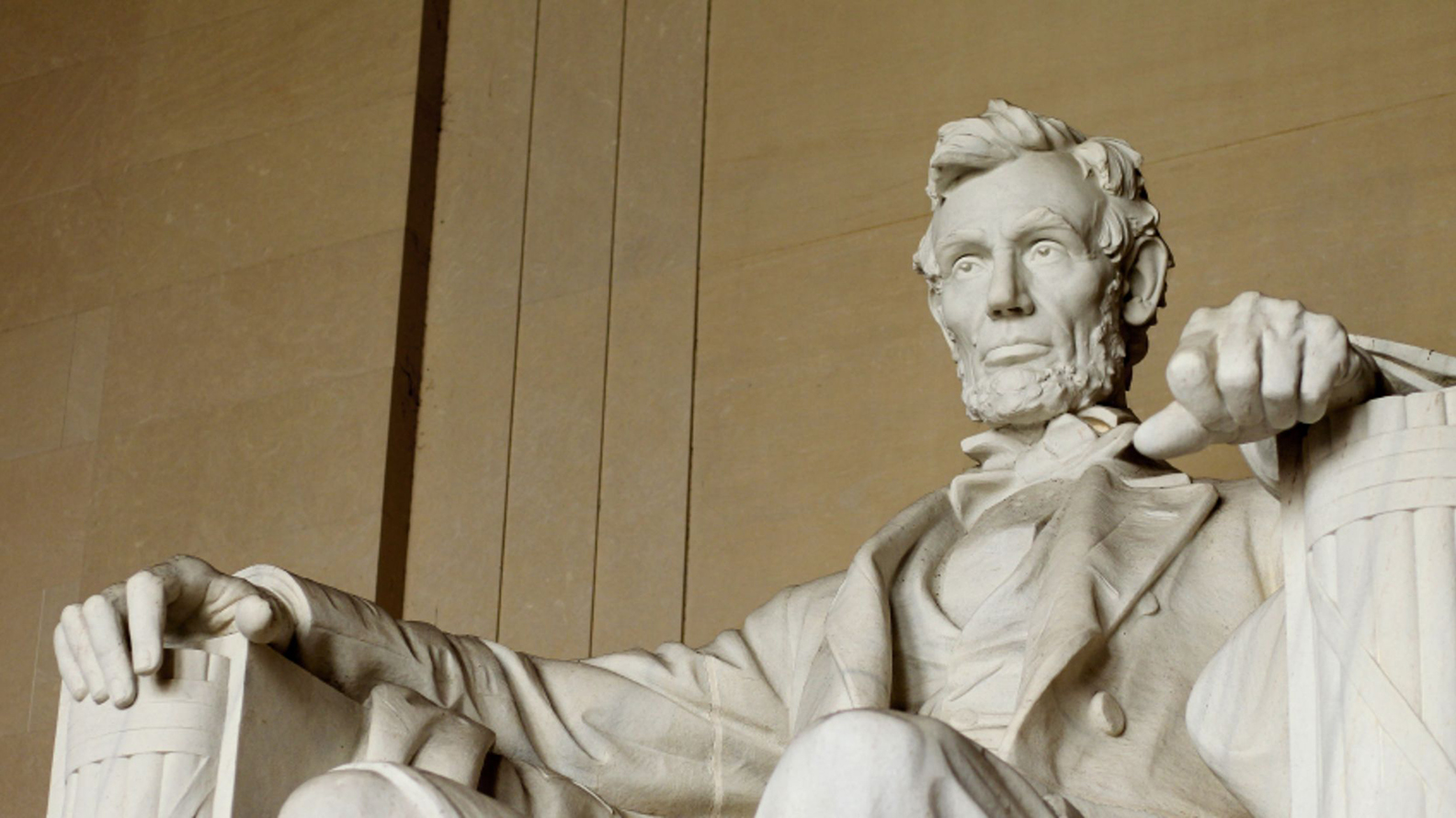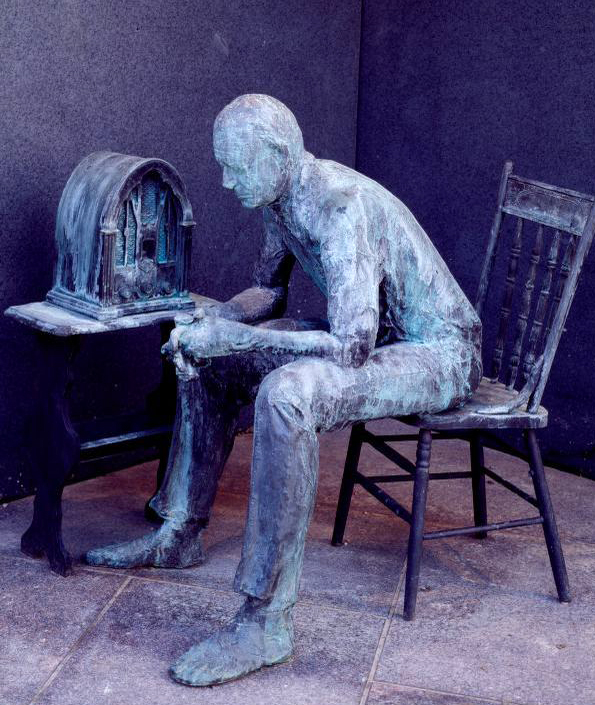 It’s just a small, rectangular piece of onion-skin paper. It was handed to us at the entrance to the exhibit, at the site of a national monument, actually. They also gave us a soft-lead pencil with the paper. It was up to us to find the information we wanted. And we did. Partway along a wall – several hundred yards long and four-feet high – containing the inscribed names of thousands and thousands of immigrants, we found the names we were looking for.
It’s just a small, rectangular piece of onion-skin paper. It was handed to us at the entrance to the exhibit, at the site of a national monument, actually. They also gave us a soft-lead pencil with the paper. It was up to us to find the information we wanted. And we did. Partway along a wall – several hundred yards long and four-feet high – containing the inscribed names of thousands and thousands of immigrants, we found the names we were looking for.
“Magdalene Kontozis Kontozoglu,” read one name, and below it, “Theodosios Kontozolglu.”
Magdalene was my mother’s mother. And Theodosios was my mother’s father, and the man after whom I am named. When we found their names on the American Immigrant Wall of Honor, at Ellis Island, in 1994, our two daughters placed the onion-skin paper against the inscriptions on the wall. They rubbed the soft-lead pencil across the paper to make an imprint.
Our visit to the wall and the Immigration Hall at Ellis Island in New York Harbor has left equally indelible impressions on me, all these years later. Without the America that opened its arms wide to my grandparents and millions of other immigrants between 1880 and the First World War, my family and I would not be here.
An election in the United States is five days away. They say it’s the most critical “first Tuesday in November” in a generation. In this column and in spoken word, I’m admittedly not terribly complimentary of American attitudes, institutions and politics. But partly because I am the grandson of those two Greek immigrants who became proud Americans, I thought I’d muse a bit about the good there is in America.
When my parents immigrated from the U.S. to Canada, after the Second World War, they, my sister and I often travelled to New York for family visits. NYC then was a kid’s paradise, especially when Theodosios showed us around. He took us to the Empire State Building for the view, Statue of Liberty for his story, Radio City Music Hall for the Rockettes and Baskin Robbins for the 31 flavours (that was big in the 1950s).
As an adult, NYC gave us a kaleidoscope of museums, art galleries, the odd Broadway show and the world’s greatest people-watching spots – Central Park, Times Square and the NYC Transit system.
For a time, my father’s work took him to Hollywood. Naturally, I visited and played tourist there too – seeing the Queen Mary museum, the hillside Hollywood sign, the Walk of Fame, and Venice Beach – each a unique celebration of American culture. One year, I chose to get to L.A. by car. A friend and I acted out the TV series Route 66 by driving the full length of the highway. My buddy Dave was Marty Milner (Todd Stiles) and (because he was Greek) I was George Maharis (Buzz Murdock).
As the song says, “It winds from Chicago to L.A. More than two thousand miles all the way.” The one difference, sadly, Dave and I didn’t drive it in a ’64 Corvette, but a ’64 Valiant. Didn’t matter, we had lived the iconic, trans-America highway for the adventure. And it was all of that.
 Nobody displays its historic leaders’ history the way the Americans do. And in Washington, I’ve walked every inch of the National Mall between the Lincoln Memorial and Capitol Hill. The Washington Monument has always left me cold, but every time I’ve approached the Daniel Chester French statue of Abraham Lincoln (built in 1922), I’ve read the 275 words of his Gettysburg Address from Nov. 19, 1863 and absorbed its meaning.
Nobody displays its historic leaders’ history the way the Americans do. And in Washington, I’ve walked every inch of the National Mall between the Lincoln Memorial and Capitol Hill. The Washington Monument has always left me cold, but every time I’ve approached the Daniel Chester French statue of Abraham Lincoln (built in 1922), I’ve read the 275 words of his Gettysburg Address from Nov. 19, 1863 and absorbed its meaning.
“That government of the people, by the people, for the people shall not perish from the earth.”
 Then, just steps from there, the Franklin Delano Roosevelt Memorial, with its cherry trees, waterfalls and stones commemorating all four of his momentous terms in office. And aside from the controversial sculpture of FDR in his wheelchair, I’ve always stopped at the George Segal sculpture, of a citizen listening to one of FDR’s legendary “Fireside Chats” at the beginning of which he coined the phrase, “My fellow Americans…”
Then, just steps from there, the Franklin Delano Roosevelt Memorial, with its cherry trees, waterfalls and stones commemorating all four of his momentous terms in office. And aside from the controversial sculpture of FDR in his wheelchair, I’ve always stopped at the George Segal sculpture, of a citizen listening to one of FDR’s legendary “Fireside Chats” at the beginning of which he coined the phrase, “My fellow Americans…”
An appreciation of America, I think, is less about place than it is about people. I fondly recall meeting George Braucht. He was from a small town in Illinois, where he farmed, was the mayor, and drove the school bus. He was truly everyman. My days spent as a teenager in a Baltimore diner kitchen with a dishwasher named Mr. Beale have stayed with me for his insight; an African American, he never saw colour, but only goodness in people. And my grandparents, the ones on that Immigrant Wall of Honor; they loved America so much, they worked all their lives – Magdelene as a seamstress, Theodosios as a cook – to improve the lives of their family.
Something to celebrate and be grateful for as America votes Tuesday.